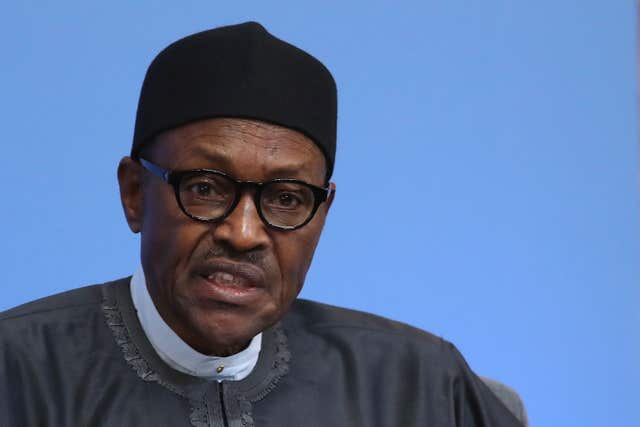Nigeria’s president addresses nation on unrest but ignores protesters’ deaths
Muhammadu Buhari urged demonstrators to desist.

Nigerian President Muhammadu Buhari spoke to the nation about the unrest that has gripped the country in recent days, but without making any mention of the shootings of peaceful protesters at Lekki toll plaza on Tuesday night that prompted international outrage.
The military opened fire without warning on thousands of peaceful protesters singing the national anthem on Tuesday night, killing at least 12 people, according to Amnesty International.
The shootings have been widely condemned but Mr Buhari did not speak of them at all during his Thursday address, instead urging protesters to stop their demonstrations.
“This government will not allow anybody or (any) groups to disrupt the peace of the nation,” he warned in his televised address, urging protesters to “resist the temptation of being used by some subversive elements to cause chaos with the aim of truncating our nascent democracy.
“For you to do otherwise will amount to undermining national security and law and order,” he said.

He called on Nigeria’s youths “to discontinue the street protests and constructively engage the government in finding solutions.
“Your voice has been heard loud and clear and we are responding.”
Mr Buhari responded to the criticism he has received from fellow African heads of state and other world leaders by calling on them “to seek to know all the facts available before taking a position, or rushing to judgment and making hasty pronouncements”.
Even as Mr Buhari was speaking, irate Nigerians flooded social media with denunciations.
“President Buhari during his speech refused to acknowledge those dead as a result of military attacked on Lekki protesters #EndSARS,” tweeted Usman Okai Austin.
“With this speech, it is confirmed we are on our own.
“May the souls of our brothers and sisters who died at #LekkiMassacre2020 and other places on #EndSARS protest rest in peace. Sad,” posted Henry Okechukwu.
The street demonstrations began early this month with calls for Nigeria’s government to shut down the Special Anti-Robbery Squad, a police unit known as Sars.
The squad was launched to fight crime, but it carried out torture and killings, according to Amnesty International.
The #EndSARS campaign spread across the country and Buhari’s government announced that it would disband the Sars unit.
The protest persisted with demonstrators calling for more widespread reforms of the police and an end to corruption.

Nigeria’s military has denied shooting at the protesters.
Violent unrest erupted on Wednesday in Lagos as mobs vandalised and burned police stations, courthouses, TV stations and a hotel.
Smoke billowed from several locations in the city as police battled angry crowds with tear gas and gunfire.
Looting and gunfire continued in Nigeria’s second-largest city on Thursday.
As looting gangs stormed through parts of Nigeria’s largest city, spreading violence for a second day in Lagos.
Plumes of smoke rose from a prison where gunfire could be heard on Thursday, and a resident of the neighbourhood where the Ikoyi Correctional Centre is located, Tunde Oguntola, said he heard gunshots as soldiers and police officers put down what appeared to be an attempted jailbreak.

He did not describe the nature of the disturbance or say if anyone had been killed.
Gangs continued to vandalise properties in Lagos, he said.
The police spokesman distinguished the “hoodlums” from the thousands of demonstrators who had been peacefully protesting police brutality on the city’s streets.
“They are looting properties, looting shopping malls and attacking ATM machines,” Mr Adejobi said.
Scores of rioters broke into a warehouse and stole food.
Gunfire was heard in several parts of Lagos.
By the afternoon, eight people with bullet wounds had been taken to Ikeja General Hospital, said a medic who spoke on condition of anonymity.
In other parts of the sprawling city of 14 million, the streets were empty and shops were shut, as residents largely obeyed a government curfew meant to curb the chaos.
Protesters active on social media disavowed the violence, saying their demonstrations had been hijacked by criminals.





